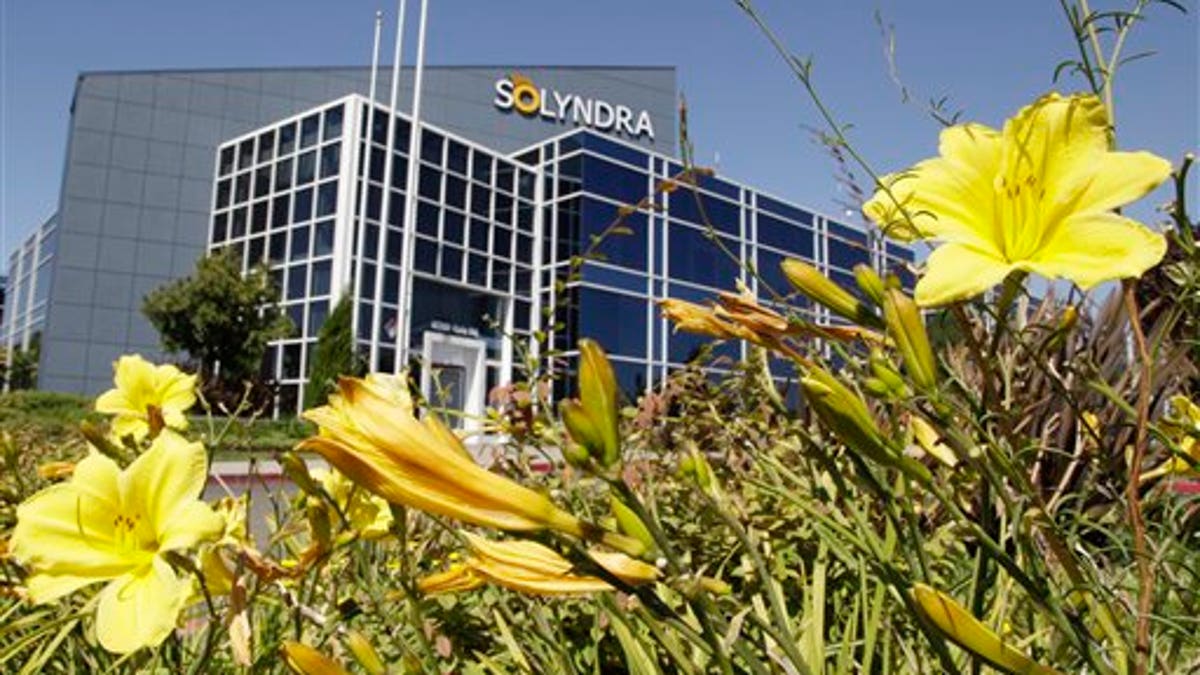
September 8, 2011: This picture shows the Solyndra headquarters in Fremont, Calif. (AP)
The fallout over the Obama administration's half-billion dollar loan to a now-bankrupt solar panel company shows the government should get out of the business for good of "picking winners and losers," Republicans said Sunday.
The company, California-based Solyndra, received $528 million in taxpayer dollars before filing for bankruptcy earlier this month and laying off more than 1,000 people. A cascade of emails and documents released over the past week showed that the loan guarantee was approved in 2009 following pressure from the company itself and the White House.
As House Republicans investigate the loan and its back-story, Rep. Paul Ryan, R-Wis., suggested the company's situation represented the tip of the iceberg. The chairman of the House Budget Committee said Washington needs to let the private sector take on these kinds of risks in the future.
"There are billions more of this exact kind of spending that came out of the stimulus that will produce these results we fear. This is industrial policy and crony capitalism at its worst. It's exhibit A for how this kind of economic policy doesn't work," he told "Fox News Sunday." "We shouldn't be picking winners or losers in Washington. We should be setting the conditions for economic growth so that the private sector can create jobs. Washington is not good at picking winners and losers, so we shouldn't try."
GOP presidential candidate Herman Cain echoed the advice.
"The government should not be in the business of picking winners and losers because most of the time they pick the losers," he said.
Cain said the loan could have been in "good faith" had the administration pulled the plug when it became apparent the company was hemorrhaging money.
Instead, the administration restructured the loan earlier this year.
The federal government wasn't the only entity backing Solyndra. Private investors were also involved, a fact the White House pointed to in arguing that it was seen as a good bet.
Administration officials also said that external economic factors hurt Solyndra and claimed that the loan proposal was thoroughly reviewed before it was approved.
Jonathan Silver, director of the Energy Department's energy loan office, said at a hearing last week that a combination of factors -- namely China flooding the marketplace with cheap solar panels and the European buying market tightening as a result of their economic troubles -- has caused solar-cell prices to plummet.
As bankruptcy proceedings get underway, part of the lingering concern with the Solyndra case has to do with the way the private investors are being treated. Republicans have complained that the loan restructuring earlier this year gave priority to private investors over taxpayers for repayment if the project went bust.
Solyndra is, as Ryan suggested, not the only company to have gone belly up after receiving stimulus money. At least four other stimulus-backed companies have since filed for bankruptcy.
Senate Republican Leader Mitch McConnell, R-Ky., pointed to the loan controversy in arguing against the president's latest call for a stimulus-style jobs package.
"More money was lost on Solyndra than came to my state to fix roads and bridges out of the entire stimulus package last year, and now he's asking us to do it again," he said on NBC's "Meet the Press." "One of my favorite sayings here in Kentucky ... is there's no education in the second kick of a mule."












































